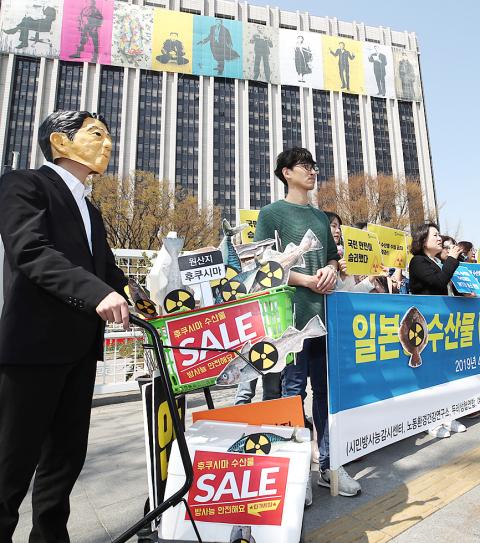Japan yesterday attacked an “extremely regrettable” ruling by the WTO that upheld a ban by South Korea on some seafood from Fukushima imposed after the 2011 nuclear power plant disaster.
The WTO’s highest court overturned an earlier judgement from last year, handing Seoul a final victory in a legal battle that has dragged on for years.
“Even though the ruling did not acknowledge that South Korea’s measures comply with the WTO rules, it is extremely regrettable that Japan’s argument was not approved,” the Japanese Ministry of Foreign Affairs said.

Photo: EPA-EFE
“There is no change in Japan’s position of demanding South Korea lift all the restriction measures, and we will pursue this via talks with South Korea,” the ministry said in a statement.
Japanese Minister of Foreign Affairs Taro Kono urged South Korea to “correct its policy,” but acknowledged that Japan had now run out of legal recourse.
Fearing radioactive contamination, Seoul imposed a partial ban on seafood imports from the region after the 2011 earthquake, tsunami and nuclear meltdown at the Fukushima Dai-ichi plant.
Tokyo first took the row to the WTO in May 2015, requesting consultations — the first step under the WTO’s settlement system.
However, talks broke down, prompting Japan to seek a WTO ruling in August 2015.
The WTO panel last year ruled that South Korea should lift its ban, but the appellate court quashed this, the final word on the subject.
According to Fukushima authorities, four countries and regions — China, Hong Kong, Taiwan and Macau — have maintained a ban on importing a broad range of locally produced foods.
South Korea, Singapore, the US and the Philippines have partial bans in place, but the majority of other countries and regions — including the EU — have lifted bans on imports or allow imports on condition that a certificate of inspection is attached.

Taiwan would remain in the same international network for carrying out cross-border payments and would not be marginalized on the world stage, despite jostling among international powers, central bank Governor Yang Chin-long (楊金龍) said yesterday. Yang made the remarks during a speech at an annual event organized by Financial Information Service Co (財金資訊), which oversees Taiwan’s banking, payment and settlement systems. “The US dollar will remain the world’s major cross-border payment tool, given its high liquidity, legality and safe-haven status,” Yang said. Russia is pushing for a new cross-border payment system and highlighted the issue during a BRICS summit in October. The existing system

Convenience store operator Lawson Inc has registered trademarks in Taiwan, sparking rumors that the Japanese chain is to enter the local market. The company on Aug. 30 filed trademarks for the names Lawson and Lawson Station, according to publicly available information from the Ministry of Economic Affairs’ Intellectual Property Office. The product categories on the application include some of Lawson’s top-selling items for use in the convenience store market. The discovery has led to speculation online that the popular Japanese chain is to enter the Taiwanese market. However, some pointed out that it might be a preemptive application to avoid others from co-opting the

Taiwan Semiconductor Manufacturing Co (TSMC, 台積電) is expected to grow its revenue by about 25 percent to a new record high next year, driven by robust demand for advanced technologies used in artificial intelligence (AI) applications and crypto mining, International Data Corp (IDC) said yesterday. That would see TSMC secure a 67 percent share of the world’s foundry market next year, from 64 percent this year, IDC senior semiconductor research manager Galen Zeng (曾冠瑋) predicted. In the broader foundry definition, TSMC would see its market share rise to 36 percent next year from 33 percent this year, he said. To address concerns

Intel Corp chief financial officer Dave Zinsner said that a formal separation of the company’s factory and product development divisions is an open question that would be decided by the chipmaker’s next leader. Zinsner, who is serving as interim co-CEO following this month’s ouster of Pat Gelsinger, made the remarks on Thursday at the Barclays technology conference in San Francisco alongside co-CEO Michelle Johnston Holthaus. Intel’s struggles to keep pace with rivals — along with its deteriorating financial condition — have spurred speculation that the next CEO would make dramatic changes. That has included talk of a split of the company’s manufacturing